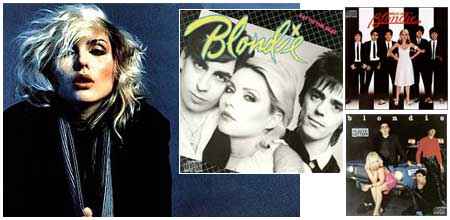Blondie

Synopsis of Pop Music
“The tide is high but I’m holding on,
I’m gonna be your number one…”
New York City was a hotbed of punk and new wave activity in the mid-70’s, overflowing with groups like The Ramones and The Talking Heads. Blondie emerged from this scene and became an international sensation with their blend of pop hooks, punk-ish edge and clever lyrics. They scored a long list of musically-diverse hit singles that defined the new wave sound and transformed their glamorous lead singer, Debbie Harry, into an alternative sex symbol.
Blondie formed in New York during the summer of 1974, taking their name from a common catcall thrown at Debbie Harry by the city’s drivers. They took the burgeoning punk attitude of the time and applied to it to their love of old-fashioned pop and soul songs (especially girl group stuff like The Shangri-La’s). The group recorded their self-titled debut album in 1976 and another, Plastic Letters, the following year. The latter album made them a hit in the U.K. with “Denis” and “I’m Still Touched By Your Presence Dear,” two songs that wrapped the band’s punkish pop in Harry’s silky croon.
Blondie went from cult band to hitmakers in 1978 when they teamed with future Knack producer Mike Chapman to create their third album, Parallel Lines. He added a pop-friendly touch to their mixture of musical styles, and the result was the massive #1 hit “Heart Of Glass.” This song effortlessly balanced disco-rhythms with glossy new-wave synth sounds and featured a distinctively sweet and airy vocal from Harry on top. It bridged the gap between the dancers and the punks, making Blondie a household name. Blondie had another Top-30 hit with the edgy hard-rocker “Hanging On The Telephone.”
Later in 1979, Blondie released Eat To The Beat and scored a Top-30 hit with “Dreaming,” which cleverly contrasted a slow-paced, dreamy melody with some of the fastest and most frenetic drumming ever heard in a pop song. The band racked up another major hit in 1980 with “Call Me,” a collaboration with Donna Summer producer Giorgio Moroder from the American Gigolo soundtrack. It balanced staccato synths, heavy guitar and a lusty, man-eating vocal from Harry to create a #1 hit. They also scored a Top-40 hit that year with “Atomic,” another stylish hybrid of new wave and disco.
At the end of 1980, Blondie released the album Autoamerican. It was their most musically-diverse album yet. “The Tide Is High,” a lilting, reggae love song with Mariachi-style horns, gave the group their third #1 hit. “Rapture” was a dance tune reminscent of Chic that featured something unusual and innovative: a sassy rap from Harry in its midsection. This made “Rapture” one of the first popular rap songs and helped lay the groundwork for hip-hop. Hip-hop artists like Coolio and Wu-Tang Clan still consider this groundbreaking song a favorite.
The members of Blondie decided to take a break in 1981. In the interim, Debbie Harry recorded Koo Koo, a solo album produced by Chic member Nile Rodgers. A singles collection, The Best Of Blondie, was also released that year. Blondie recorded The Hunter in 1982 and scored a Top-40 hit with a horn-driven reggae sound of “Island Of Lost Souls.” The band broke up later that year when Chris Stein developed a health problem that required a long period of recovery.
The members of Blondie continued to stay active throughout the 80’s. Harry was the most visible, dividing her time between solo recording and acting in films like Videodrome and Hairspray. Over time, she became an alternative icon and was even paid tribute to by The B-52’s in the song “Debbie.” She reunited with her former band members in 1998, touring extensively and putting out a new album in 1999, No Exit. They were rapturously received by fans old and new, especially the hip-hoppers raised on “Rapture,” proving that their attitude-heavy mix of sounds remains as relevant as ever.
Artist Release History
1976 - Blondie1977 - Plastic Letters
1978 - Parallel Lines
1979 - Eat to the Beat
1980 - Autoamerican
1981 - The Best of Blondie
1982 - The Hunter
1988 - Once More into the Bleach
1991 - Greatest Hits
1993 - Blonde & Beyond (compilation)
1994 - Platinum Collection
1995 - The Remix Project
1996 - Back to Back Hits(compilation)
1997 - Picture This Live
1997 - The Essential Collection
1998 - Denis (compilation)
1998 - Beautiful (remixes)
1999 - No Exit
1999 - Live in New York
Pop Sub Categories
rockpop
Essential Music Albums
Parallel Lines (Chrysalis)The Best Of Blondie (Chrysalis)
Band Members
Debbie Harry lead vocalsChris Stein guitar
Frank Infante guitar
Jimmy Destri keyboards
Gary Valentine (1974-1977) bass
Nigel Harrison (1977-1982) bass
Clem Burke drums
